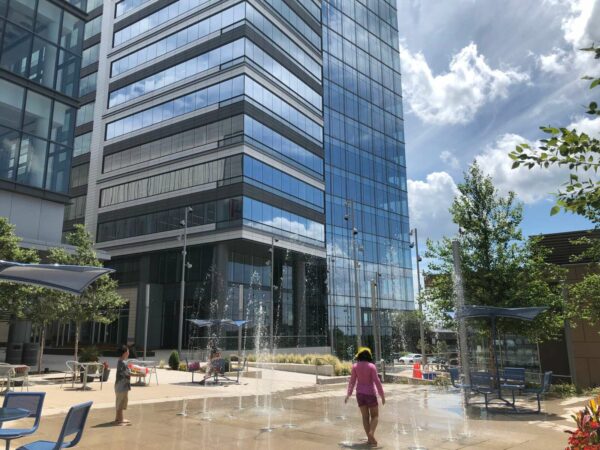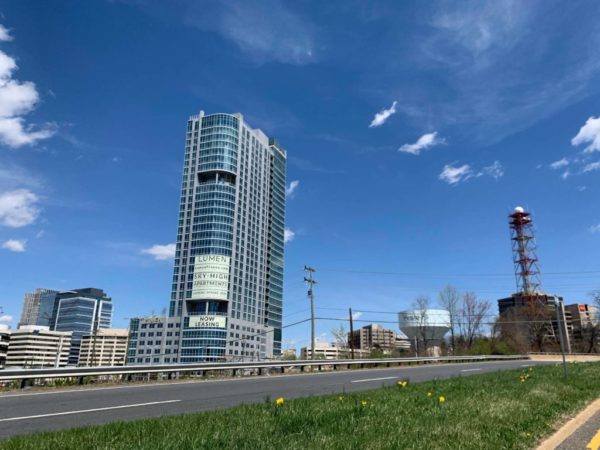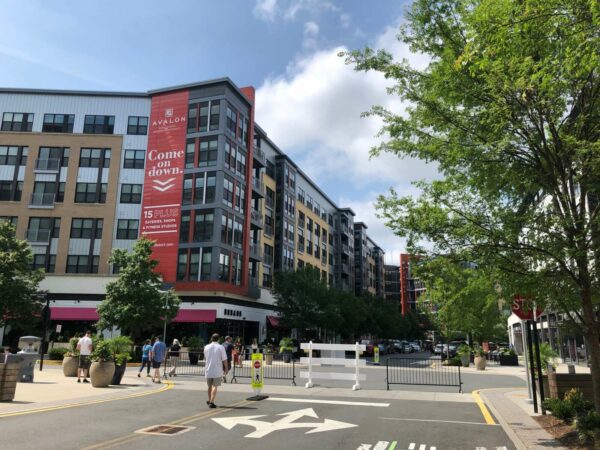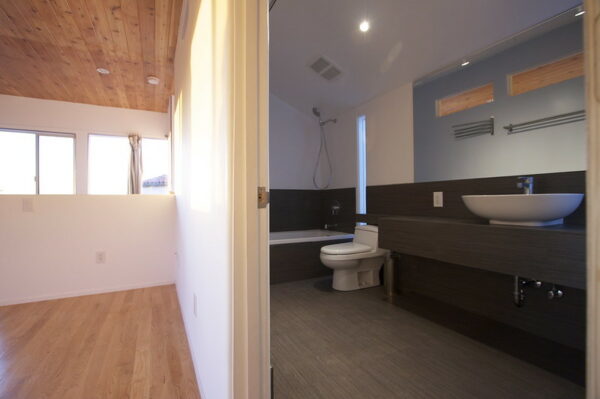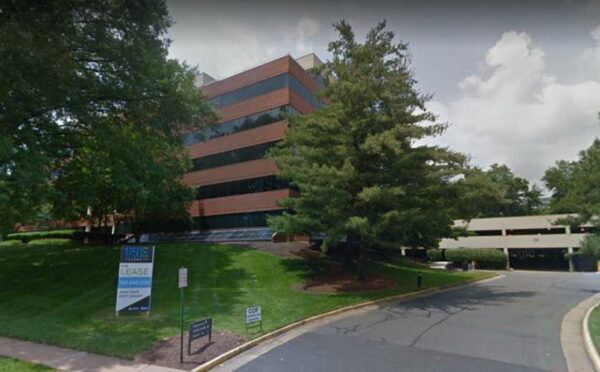
(Updated at 4:30 p.m.) A developer wants to bring hundreds of workforce housing units to Tysons East with a proposal that would replace an aging, vacant office building near the McLean Metro station with a residential complex.
Under the name Somos at Tysons LLC, SCG Development plans to build a mixed-use building at 1750 Old Meadow Road with 460 residential units and approximately 5,000 square feet of ground-level commercial space.
At least 300 of the residences would be made affordable to households that earn up to 60% of the area’s median income (AMI), according to a rezoning application submitted to Fairfax County on Oct. 1.
That commitment would easily exceed the workforce dwelling unit (WDU) requirements that the Fairfax County Board of Supervisors adopted for the Tysons Urban Center on Feb. 23, giving developers the option to provide 10% WDUs at 60% AMI or 13% WDUs with a greater mix of income levels.
According to a statement of justification written by John McGranahan Jr., a land-use attorney representing the developer, SCG’s proposal comes in part to satisfy proffer requirements that the property must meet due to its proximity to the nearby Capital One Center and Scotts Run developments.
“The vision of Tysons as an urban center where people live, work and play must include a diversity of housing opportunities at price points across the income spectrum,” McGranahan wrote. “This application will deliver a greater number of affordable units at the 60% of AMI level much sooner than would be achieved with existing proffers and Tysons Plan policies, all within a convenient 1/3 mile walk to the McLean Metro Station.”
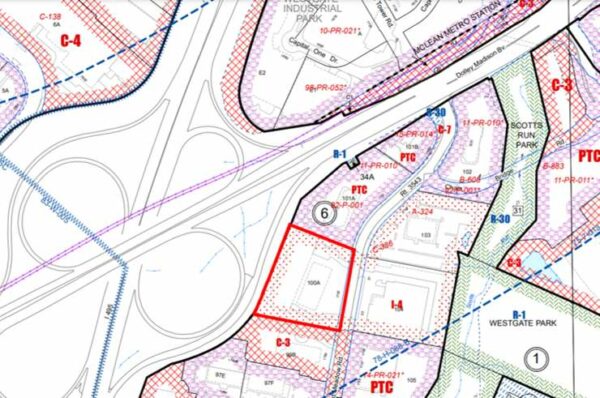
To make way for the new development, SCG says it will raze the seven-story office building that currently occupies 1750 Old Meadow Road, but an existing three-level parking garage behind the building will be left intact.
Constructed in 1985 and occupied for more than 36 years, the 142,000 square-foot office building was sold by owner Matan Companies in 2018. It’s in the former West*Gate office park, a portion of which is being transformed into the Highland District.
SCG’s plans call for a mixed-use building with a maximum height of eight floors or 85 feet and 440,605 square feet of gross floor area, which would increase to 470,453 square feet with the bonus density granted by the workforce housing commitment. Read More
As one major Falls Church development takes a step toward completion, another is just getting started.
Developer Atlantic Realty Companies, which owns George Mason Square and nearby buildings, hopes to transform the area with a mixed-use complex dubbed One City Center, which will include 246 residential units, office space, retail, and a grocery store.
“This is an area that has long been planned to evolve into a downtown vibrant hub,” Andrew Painter, an attorney representing the developer, said at a Sept. 27 Falls Church City Council meeting.
As part of the project, the company plans to demolish and replace a rear two-story parking garage with a building that’s nine or 10 stories tall, add a park on a vacant corner lot at South Maple Avenue and West Annandale Road, and create a pedestrian-friendly street — a Dutch-inspired woonerf — with a 30-foot by 40-foot exterior screen.
“The Digital Screen may be used to display art, landscapes, movies and theatrical presentations for ‘screen on the green’ events, coverage of live City events and performances (e.g., Watch Night performances, Memorial Day parade, etc.), promotion of the project’s retailers and City services, and related programming,” a voluntary concessions document from June 23 says.
Other buildings to be demolished include the former BB&T Bank and a tailor business building, where a temporary parking lot would be created during construction.
Atlantic Realty unveiled an initial proposal for the project on Feb. 11 and submitted a second version on June 23. The company is working with Falls Church officials as it seeks to get approval from the city council, possibly on Feb. 28 next year.
An agreement calls for designating 6% of the units — up to 15 units — as affordable. Painter said the developer is working with the city to determine what that would entail.
As part of the application, the developer is seeking special exceptions, one of which includes increasing a building height from a maximum of 75 feet to up to 115 feet.
City Looks at Proposed Concessions
The City of Falls Church has been working with the developer on concessions to make the project become a reality.
Among numerous concessions, a proposed agreement calls for:
- A one-time payment of $1.7 million to schools to offset capital costs, provided all 246 units are built
- 30 public parking spaces
- A 3,000 square-foot conference center (about two-thirds the size of a basketball court) that would be available to commercial tenants in the new development and George Mason Square, nonprofits, and the city for meetings
Painter said the conference space could be used by the city and nonprofits at no cost.
The developer and project leads showcased the potential of the site on a walking tour on Wednesday (Sept. 29), making the case that a new bus shelter, bikeshare, pedestrian crossings, and other upgrades would improve transportation.
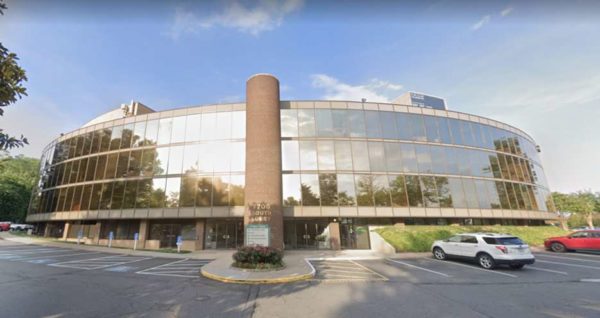
The Fairfax County Planning Commission will vote on the possibility of converting a Tysons office building into residential use when it meets this Wednesday (Oct. 6).
The decision for the building at 7700 Leesburg Pike follows the commission’s deferral of a decision on the potential plan amendment during a Sept. 29 public hearing.
EYA Development submitted a rezoning application and development plan for the 6.7-acre site to redevelop the property on Dec. 15 before it was accepted by the county’s Department of Planning and Zoning on March 5.
Under the developer’s proposal, the site would be converted to 80 to 107 single-family attached units or stacked townhomes. The site currently houses a 167,274-square foot office building that was constructed in 1976.
In a presentation to the planning commission during last week’s public hearing, county planner Stephen Waller stated that staff considered a range of factors related to the amendment, including:
- Land use compatibility with surrounding neighborhoods
- Quality of active and passive open space
- Tree preservation and transitional buffers
- Storm water management
- Multimodal connectivity
- Historic resources
Waller added that staff recommends approving the plan amendment “to allow for an option for the property to develop with residential use with single-family attached dwellings or stacked townhomes.”
The recommendation comes with several proposed conditions, including a maximum height of four stories with siding design elements and landscaping to make the property compatible with adjacent low-density residential neighborhoods, as well as high-quality, well-designed, attractive, and publicly accessible open space and site amenities.
Other staff recommendations include:
- Preservation of existing healthy and mature trees along boundaries
- Supplement buffers year-round for screening visual to adjacent residences
- Stormwater management controls above the minimum standards
- Safe and conveniently access to existing and planned multimodal options
- Document existing office for significance prior to demolition
Mark Looney, a partner with the Cooley law firm, spoke on behalf of EYA at the public hearing. He said the developer is working to address requests from the Pimmit Hills Civic Association (PHCA) for pedestrian improvements and upgrades are being addressed, but the PHCA and McLean Citizen’s Association have both offered general support for the proposal.
“The plan amendment contemplates a significant open space component,” he added.
Under the developer’s rezoning application, approximately 36% of the site has been reserved for either open space or urban park land that will be accessible to both residents of the development and residents of the surrounding communities. The public space plans include a fitness trail, small dog walk, and playground area.
EYA has also made provisions for a future expansion of Route 7, including the bus rapid transit proposal that will be brought to the commission later in the fall, according to Looney.
During the public hearing, Commissioners John Ulfelder and Mary Cortina sought further explanation of the stormwater management standards that have been proposed for the site.
According to Waller, staff’s condition that the stormwater management be above the county’s minimum standards was made in recognition of existing conditions of the Pimmit Run watershed and flooding in the area.
Looney said two quantity facilities have been proposed for the site — a vault along Route 7 and a set of chambers in the northeast portion of the property — that would capture water before releasing it at a slower rate than current conditions. A series of other filter devices across the property would also improve the quality of water that’s released.
However, he added that he would require engineers for the company to further explain the water management efforts in more specific detail following the hearing.
Photo via Google Maps

The Vienna Town Council approved a project on Monday (Sept. 13) to develop a vacant property with cottage housing-style duplexes.
Developer JDA Custom Homes is looking to construct six two-family dwellings at a 1.38-acre site at 117-121 Courthouse Road SW, where each unit would have a two-car parking garage at the basement level and belong to a homeowners’ association.
JDA Vice President Jordan Rice described the outside of the homes by saying they will use low-cost materials aimed at people looking to downsize their living space.
Her father, Dennis Rice, the company’s founder, said each home will have approximately 1,200 square feet on the main level and about 600 square feet on the second floor.
He declined to say what the price of each home or range would be when asked by Councilmember Nisha Patel at the public hearing.
“Do you foresee each unit being at least under $1 million?” she said.
“At this time, I cannot make any…statement on that,” Dennis Rice said, citing rising building material costs and adding that he couldn’t make a guess at this point.
Patel said she likes the project, which will provide an alternative to the single-family, standalone houses that dominate the Town of Vienna, but she noted that the majority of homes in the town are under $1 million.
Councilmember Chuck Anderson asked if two units could be reduced in size to make them more affordable. Dennis Rice replied that the units “really don’t become sellable” if they’re any smaller.
The town council first voted 5-0 to approve rezoning the lots from a single-family residential district to a multi-family, low-density area. Patel and Councilmember Ray Brill abstained from the vote.
After the rezoning was approved, JDA proposed changes to several development requirements, including one aimed at reducing the footprint of constructed buildings and amenities. The zoning area there limits lot coverage to 25% at most for anything from buildings, parking spots, and athletic courts to patios and terraces.
The developer asked for an allowance up to 60% but believes it can achieve the development with 55.3% lot coverage, the town said. The gap leaves room for flexibility, according to the developer.
Changes to rear and front setbacks as well as other lot requirements were also requested.
As part of its application, JDA noted that 13 other developments in the town had lot coverages ranging from 33.9% (Park Terrace Condo section two at 212-218 Locust St. SE) to 66.6% (Vienna Villager at 200 Locust St. NE).
Brill expressed concern that the town council is getting ahead of itself in trying to change Vienna’s housing stock, giving developers more influence than individual homeowners. He added that the town might want to finish its ongoing zoning code rewrite first.
Councilmember Ed Somers said the opportunity could evaporate and the developer didn’t have to go this route.
Patel also raised a concern about the front yard setback, in which the applicant requested the town allow two homes 23 feet from a sidewalk and a one-story clubhouse 20 feet away from the pedestrian route. The required setback there is 35 feet.
However, the town council ultimately approved the site modifications 6-0 with Patel abstaining.
Vienna Church Assists with Afghan Resettlement Efforts — The Vienna Presbyterian Church is working with OneHeartDC and Lutheran Social Services to support the ongoing effort to help Afghan refugees who have come to Northern Virginia after fleeing their now-Taliban-controlled homeland. The church is specifically asking for donations of “welcome home kits” that can be dropped off at 123 Park Street NE on Wednesday or Thursday (Sept. 1 and 2). [Patch]
McLean-Based Firefighter Dies — “The Fairfax County Fire and Rescue Department is deeply saddened to announce the death of Firefighter Kevin Weaver, who passed away Saturday, August 28, 2021. Firefighter Weaver has been a valued member of the Fairfax County Fire and Rescue Department since joining in September 2018 as a member of Recruit Class 144. He was assigned to Fire Station 1, McLean, at the time of his passing.” [FCFRD/Facebook]
Vienna Planning Commission Approves Cottage Development — “A proposal to build 12 “cottage-style” housing units at 117-121 Courthouse Road, S.W., received the Vienna Planning Commission’s unanimous approval Aug. 25 and now heads to the Town Council. Developer Dennis Rice of JDA Custom Homes is proposing to build six two-family dwellings clustered along a common green.” [Sun Gazette]
Tysons Corner Disney Store To Survive Closures — The Disney store at Tysons Corner Center will be the last one standing in Northern Virginia with its lone remaining companion at Potomac Mills set to shutter by Sept. 15. The company is closing all about a couple dozen of its physical stores this year to focus on online retail, though Target is planning to open more than 100 Disney shops inside its stores by the end of 2021. [Patch]
Tysons Interfaith Hosts Essay Contest on Post-COVID Future — “Tysons Interfaith, a coalition of 19 faith communities in the Tysons area, is sponsoring an art and essay contest focusing on positive lessons from the COVID pandemic. ‘A Whole New World Starts Now’ will offer cash prizes for those in three age groups: youth (12 and under), teen (13-18) and adult…Entries will be accepted through Oct. 15, with award winners announced Nov. 1.” [Sun Gazette/Inside NoVA]
Fairfax County officials support the recent reinstatement of the federal eviction mortarium and plan to continue providing rental assistance to those in need.
Earlier this week, the Centers for Disease Control and Prevention — at the behest of President Biden — renewed the ban on evictions through Oct. 3 in areas that have “substantial” or “high” community transmission of the novel coronavirus.
Fairfax County currently has “substantial” transmission, according to the CDC’s COVID data tracker.
County officials have expressed their support for the eviction mortarium, despite some debate over its legality.
“We are glad that the eviction moratorium has been extended, which will continue to provide peace of mind for families across the country,” Fairfax County Board of Supervisors Jeff McKay wrote in a statement.
Early this year, the county received $34 million for emergency rental assistance from a COVID-19 relief package passed by Congress late last year.
This allowed the county to launch a new Emergency Rental Assistance (ERA) program in early June aimed at helping not only residents, but landlords as well. Since the program launched, McKay says the county has distributed more than $8 million to 997 households through the ERA.
“In Fairfax County, we’re not dragging our feet,” McKay said. “We know our residents need assistance now, and we’re continuing to build upon our existing human services programs to meet the vastly increased need within our community.”
Help is still needed, though. Even with the federal eviction mortarium in place for most of the last 18 months, 668 writs of eviction and 1,562 unlawful detainers have been issued to county residents since July 2020, according to an Eviction Data Dashboard created by county staff.
Overall, the data shows that the threat of eviction is higher in areas hit harder by COVID-19.
According to the dashboard, the zip codes with the highest number of writs of eviction are 22102, which covers west McLean and parts of Tysons, and 22306 in Alexandria, covering the Groveton neighborhood and parts of the Lee District.
Late last year, Fairfax County created an eviction prevention task force to coordinate a countywide approach to helping keep people in their homes.
Fairfax County Neighborhood and Community Services Deputy Director Sarah Allen said in a statement that outreach to the county’s most vulnerable communities is ongoing:
Outreach efforts are underway, particularly to support our most vulnerable communities. Fairfax County agencies partner with numerous providers and are available at community events including vaccine equity clinics, health fairs and back-to-school events to ensure that residents are informed of the assistance and services available to them. We are also partnering with non-profit organizations, houses of worship and other faith-based organizations to reach communities in need.
Allen also notes that tenant and landlord checklists and a guide to the eligibility requirements for rent assistance are available in multiple languages, including Arabic, Amharic, Chinese, Farsi, Korean, Spanish, Urdu, and Vietnamese.
There’s another potentially complicating factor.
The eviction moratorium initially expired on July 31 and was extended on August 3. The CDC order says any eviction completed between August 1 and August 3 is not subjected to the order since it does not operate retroactively, meaning evictions completed during Aug. 1-3 are potentially valid.
However, Allen says the county does not know of any completed evictions during that three-day period.
“We are not aware of any evictions during that gap in time as there is still a court process required to evict,” writes Allen. “County staff is working closely with non-profit legal assistance organizations such as Legal Services of Northern Virginia for support and guidance around the eviction process.”
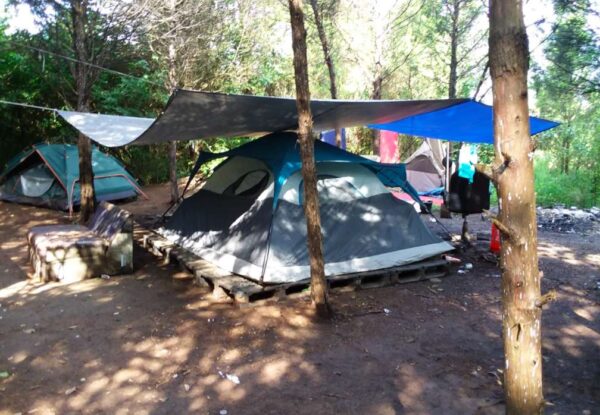
Thanks to federal relief funding, Fairfax County is getting an infusion of emergency housing voucher money to help people who are at risk of homelessness or fleeing from domestic violence and others in need.
The American Rescue Plan Act signed into law in March is providing $10 billion to address homelessness, including 70,000 vouchers to local housing authorities, including Fairfax County.
The county will partner with community groups to provide the housing assistance, which could last 10 years — the length of the program — for each recipient.
“We are very grateful to receive these Emergency Housing Vouchers to serve many of our most vulnerable residents and neighbors and help them achieve safe and stable housing,” Fairfax County Redevelopment and Housing Authority Chair C. Melissa McKenna, who serves as the Dranesville District commissioner, said in a statement.
The Fairfax County Redevelopment and Housing Authority approved a county framework last Thursday (July 15) to receive the money, which involves 169 vouchers that will be made available in coming weeks.
Recipients will need to be referred to the program by county case managers or other service points, such as homeless services, Coordinated Services Planning (703-222-0880), or the Domestic and Sexual Violence 24-Hour Hotline (703-360-7273).
Money will go to landlords, and recipients will be required to pay 30% of their income toward rent and utilities.
The emergency housing vouchers can cover a variety of costs, including security deposits, moving expenses, and essential household items such as bedding and tableware.
Even outside the vouchers, ARPA has dedicated billions of dollars to addressing housing issues, as people have struggled to pay rent amid statewide shutdowns last year and uncertain employment due to the COVID-19 pandemic.
The need to provide housing assistance is expected to become especially urgent in the coming months after the Centers for Disease Control and Prevention’s eviction moratorium expires on July 31.
“The [assistance is] designed to prevent and respond to [the] coronavirus by facilitation the leasing of the [emergency housing vouchers], which will provide vulnerable individuals and families a much safer housing environment to minimize the risk of coronavirus exposure or spread,” Dominique Blom, a general deputy assistant secretary with the Housing and Urban Development Department, said in a May memo describing the funding.
Vaccinations have helped bring the virus under control, but cases have been rising in Virginia and the U.S. amid the spread of the highly contagious delta variant, which is now the source of 83% of all new COVID-19 cases, according to CDC estimates.
“Individuals and families who are homeless or at-risk of homelessness are often living in conditions that significantly increase the risk of exposure to coronavirus in addition to other health risks,” Blom said in the memo.
Eligibility for the vouchers is limited to individuals and families who are experiencing homelessness, at risk of homelessness, or were recently homeless and “for whom providing rental assistance will prevent the family’s homelessness or having high risk of housing instability.”
People fleeing — or attempting to flee — domestic violence, dating violence, sexual assault, stalking, or human trafficking are also eligible for the vouchers.
“These vouchers — in addition to the existing programs and services offered through a robust partnership — offer yet another valuable resource to help position individuals and families on a reliable foundation from which they can achieve their fullest potential,” McKenna said in her statement.
During the first year of the pandemic, homelessness decreased throughout the D.C. region except in Fairfax County, which saw a 17% increase from 1,041 people in 2020 to 1,222 in 2021, and Prince George’s County, which had a 19% increase, according to a Metropolitan Washington Council of Governments report.
Fairfax County has attributed the increase to expanded services supported by COVID-19 relief funding.
Tropical Storm Elsa Heads to Virginia — After leaving Florida behind, Tropical Storm Elsa is expected to bring heavy rain and strong winds along the East Coast from Georgia to New England through Friday. Forecasts show the storm passing to the east, but the D.C. area on I-95 could get some rain and breezy conditions tonight. [Capital Weather Gang]
Falls Church Developer Proposes More Senior Housing — “The Falls Church Gateway developer partnership getting underway with work on the 9-acre site of the former George Mason High School came to the F.C. City Council Monday with a request, granted a preliminary vote by a 7-0 margin, to expand the senior living building set for the site from 225,000 square feet to 260,000, including a height increase to 15 stories to accommodate up to 215 units.” [Falls Church News-Press]
Cause of Bird Deaths Still Unknown — The Virginia Department of Wildlife Resources received more than 1,400 reports of sick or dying birds in Northern Virginia, including Fairfax County, between May 23 and June 30. No cause has been identified yet, but symptoms of the illness include eye swelling and neurological issues. [Vienna Police/Twitter]
Travel Ban Puts Falls Church Couple’s Wedding Plans at Risk — “The pandemic has prevented a couple from Falls Church, Virginia, from walking down the aisle, and now they say they’ll lose $30,000 if the U.S. travel ban on citizens from Britain and other European nations isn’t lifted soon.” [WTOP]
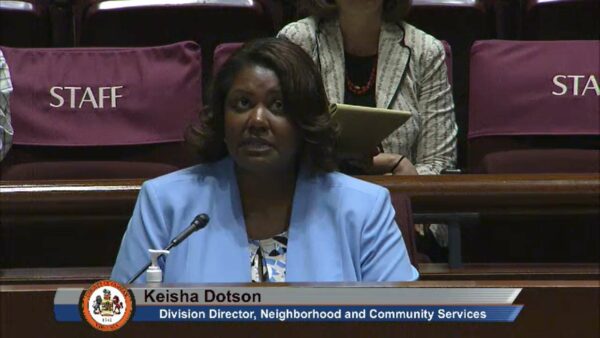
With a federal moratorium on evictions set to expire at the end of July, Fairfax County officials are preparing for a surge in evictions and accompanying demand for rental assistance and other social services.
Even with various federal and state protections in place during the COVID-19 pandemic, 599 writs of eviction and 1,411 unlawful detainers were issued to Fairfax County residents between June 2020 and 2021, according to an Eviction Data Dashboard created by county staff.
Presented to the Board of Supervisors during its health and human services committee meeting on Tuesday (June 29), the dashboard map indicates that the residents at risk of being evicted tend to be concentrated in neighborhoods of color and ones that have been hit hard by the novel coronavirus, Fairfax County Housing and Community Development Deputy Director Tom Barnett told the board.
As of June 14, residents of the 22306 zip code in Alexandria have been issued 54 writs of eviction — court notices directing the Fairfax County Sheriff’s Office to remove a tenant’s belongings from the property — the most of any zip code in the county.
That zip code has also recorded 3,641 COVID-19 cases, which translates to 11,263 cases per 100,000 people, the highest rate in the county. Within that zip code, eviction notices have been clustered south of Groveton and around Woodley Hills, census tracts with relatively high Black and Hispanic/Latino populations.
The Alexandria area in general has been particularly affected by housing instability during the pandemic with 159 writs of eviction issued, more than twice as many as any other part of the county. Falls Church comes in second with 73 writs issued.
Alexandria and Falls Church have also seen the most unlawful detainers, which are issued when a landlord seeks court assistance in removing a tenant from their property.
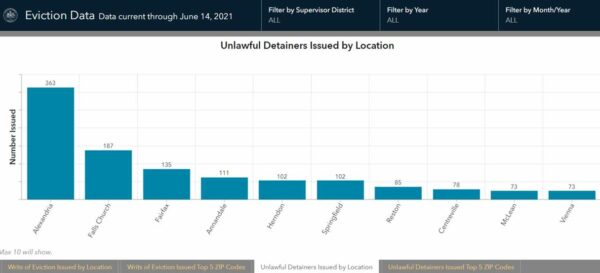
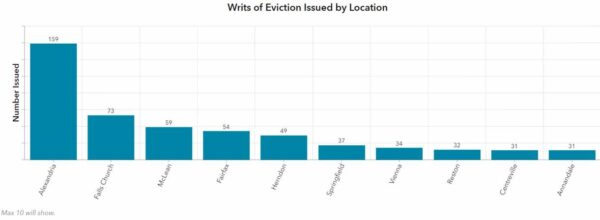
There are some exceptions to the overall correlation of eviction notices and COVID-19 cases. The 22102 zip code, which includes Tysons, saw writs of eviction issued — the second most in the county — but it has also reported a relatively low rate of 5,481 COVID-19 cases per 100,000 people.
Fairfax County Health and Human Services staff put together the dashboard using real-time information obtained from the Fairfax County Sheriff’s Office and General District Court, thanks to a partnership that the agencies formed last summer in response to the pandemic.
“We’re using this data and other data that is available to the county to target our outreach and our rental assistance,” Barnett said. Read More
Homeowners seeking to rent out their basements or other parts of their residence as well as renters and neighborhoods concerned about parking will soon have new rules aimed at helping them.
A revised zoning code for Fairfax County, the first overhaul in around 40 years, becomes effective Thursday (July 1).
In addition to updating the county’s regulated uses with new options like live-work developments and solar farms, the new ordinance loosens some restrictions around accessory dwelling units — independent residential units that share a property with a main dwelling. But zoning officials say they expect a modest increase in homeowners converting parts of their property for other people.
Adopted in March, the new rules replace existing standards for ADUs — now dubbed accessory living units or ALUs — from 1978 and 1983, drop requirements that the occupant of the revamped space have a disability or be 55 years or older, and add parking requirements.
While the changes inspired some strong opinions from community groups, their impact is expected to be relatively small: Fairfax County approved 12 accessory unit applications in 2019, seven in 2020, and two so far this year as of Friday.
County staff previously noted there have been community concerns over whether the code is being enforced. A burdensome special permit approval process also may have been creating problems, the county said.
“Others may be installing ALUs anyway, but then perhaps they’re more likely to be unpermitted construction without the benefit of the permits and inspections,” Carmen Bishop, assistant zoning administrator, said in January before the Fairfax County Planning Commission. “So a less burdensome process may result in better compliance.”
People who have wanted such changes have had to go through a hearing, a process where neighbors could weigh in. Under the new rules, a property owner can add an interior ALU with just an administrative permit instead if they meet certain requirements.
That includes a new measure that adds an extra parking spot in off-street parking. Whether or not there’s an accessory living unit, a detached single-family house on a public street must have two off-street parking spaces or — if it’s on a private street — three off-street spots, according to the county.
“When a house has an ALU, one additional parking space will be required, which means, homes on public streets will need three off-street spaces and homes on private streets will need four off-street spaces to meet the zoning ordinance standard,” Leslie Johnson, the zoning administrator for the county’s Department of Planning and Development, said in an email Friday.
The new standards come as the county’s population exceeds 1.1 million people after rising by over 100,000 people every decade from 1980 to 2010, according to census data.
With housing prices expected to continue rising, proponents of the ALU rule changes argue that they will provide more flexibility for residents who want to stay in the county but can’t afford to live on their own.
Earlier in June, the Fairfax County Redevelopment and Housing Authority approved a change that made it easier for certain people in a first-time homebuyers program to rent a portion of their owner-occupied homes after a resident made a request.
The switch applies to 38 units and makes the authority’s policy consistent with all other units in county homebuyer programs, county spokesman Benjamin Boxer said in an email.
“Those owners may rent a portion of their home as long as they continue to occupy the property as their primary residence,” Boxer said in an email. “It is worth noting that, historically, we have rarely received any requests from our participating homeowners to rent portions of their homes.”
Courtesy Jeremy Levine/Flickr


